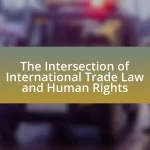International Labor Standards, established by the International Labour Organization (ILO), serve as essential guidelines for promoting fair and humane working conditions worldwide. This article examines the challenges associated with implementing these standards, including varying national laws, economic conditions, and cultural attitudes. It highlights the role of governments, NGOs, and civil society in enforcing labor rights, as well as the implications of non-compliance for workers and economies. Additionally, the article discusses strategies for overcoming obstacles to implementation and the importance of international cooperation in fostering adherence to labor standards.

What are International Labor Standards?
International Labor Standards are guidelines established by the International Labour Organization (ILO) to promote fair and humane working conditions globally. These standards encompass various aspects of labor rights, including freedom of association, the right to collective bargaining, elimination of forced labor, abolition of child labor, and the elimination of discrimination in employment. The ILO has adopted over 190 conventions and recommendations that serve as a framework for countries to improve labor conditions and protect workers’ rights, thereby ensuring a minimum level of social justice and equity in the workplace.
How are International Labor Standards defined and established?
International Labor Standards are defined and established through the International Labour Organization (ILO), which formulates these standards to promote fair and equitable labor practices globally. The ILO develops conventions and recommendations that member states can adopt, which are then ratified by governments, thereby creating binding obligations. For instance, the ILO’s core conventions address fundamental rights at work, such as the elimination of forced labor and child labor, and the promotion of freedom of association. These conventions are based on extensive research, consultations with stakeholders, and historical precedents, ensuring they reflect the evolving nature of work and labor rights.
What organizations are responsible for creating these standards?
The organizations responsible for creating international labor standards include the International Labour Organization (ILO), the United Nations (UN), and various regional bodies such as the European Union (EU). The ILO, established in 1919, is the primary agency that formulates and oversees international labor standards, focusing on promoting rights at work, encouraging decent employment opportunities, and enhancing social protection. The UN supports these efforts through its broader human rights framework, while the EU develops specific labor regulations applicable to its member states. These organizations collectively contribute to the establishment and enforcement of labor standards globally.
What key principles underpin International Labor Standards?
The key principles underpinning International Labor Standards are fundamental rights at work, including freedom of association, the right to collective bargaining, the elimination of forced labor, the abolition of child labor, and the elimination of discrimination in employment. These principles are established by the International Labour Organization (ILO) and are designed to promote social justice and fair labor practices globally. The ILO’s Declaration on Fundamental Principles and Rights at Work, adopted in 1998, reinforces these principles by obligating member states to respect and promote them, regardless of their level of economic development. This commitment is evidenced by the ratification of various ILO conventions that embody these principles, which serve as a framework for improving working conditions and protecting workers’ rights worldwide.
Why are International Labor Standards important for global labor markets?
International Labor Standards are crucial for global labor markets because they establish a framework for fair and equitable working conditions across countries. These standards promote fundamental rights such as freedom of association, the right to collective bargaining, and the elimination of forced labor and child labor, which are essential for protecting workers’ rights globally. According to the International Labour Organization, adherence to these standards can lead to improved working conditions, increased productivity, and enhanced economic stability, as countries that implement these standards often experience better labor relations and reduced conflict. This alignment fosters a more level playing field in international trade, ensuring that businesses compete fairly while respecting human rights and labor rights.
How do these standards impact workers’ rights and protections?
International labor standards significantly enhance workers’ rights and protections by establishing minimum requirements for working conditions, wages, and safety. These standards, set by organizations such as the International Labour Organization (ILO), provide a framework that countries can adopt to ensure fair treatment of workers. For instance, the ILO’s conventions on forced labor and child labor have led to legal reforms in numerous countries, resulting in improved labor laws and enforcement mechanisms. As a result, workers experience greater job security, access to fair wages, and safer working environments, which collectively contribute to the overall protection of their rights.
What role do International Labor Standards play in promoting fair competition?
International Labor Standards play a crucial role in promoting fair competition by establishing a level playing field for businesses across different countries. These standards, set by organizations such as the International Labour Organization (ILO), ensure that all workers are treated fairly, which prevents companies from gaining an unfair advantage through exploitative labor practices. For instance, adherence to these standards can lead to improved working conditions, fair wages, and the prohibition of child and forced labor, which not only enhances the welfare of workers but also fosters a more equitable market environment. By creating uniform labor practices, International Labor Standards help to mitigate the risk of a “race to the bottom,” where companies might otherwise cut costs by undercutting labor rights, thus promoting sustainable economic growth and fair competition globally.

What challenges arise in implementing International Labor Standards?
Implementing International Labor Standards faces several challenges, including varying national laws, economic conditions, and cultural attitudes towards labor. Different countries have distinct legal frameworks that may conflict with international standards, making compliance difficult. For instance, developing nations often prioritize economic growth over labor rights, leading to lax enforcement of standards. Additionally, cultural norms can influence perceptions of labor practices, resulting in resistance to adopting international standards. According to the International Labour Organization, only 90 out of 187 member states have ratified key conventions, highlighting the disparity in commitment to these standards.
What are the common obstacles faced by countries in adopting these standards?
Countries commonly face several obstacles in adopting international labor standards, including economic constraints, political resistance, and lack of infrastructure. Economic constraints often arise from limited financial resources, making it difficult for countries to implement necessary changes. Political resistance can stem from existing power structures that may oppose reforms, fearing loss of control or influence. Additionally, a lack of infrastructure, such as inadequate training programs or enforcement mechanisms, hampers effective implementation. For instance, a report by the International Labour Organization highlights that developing nations frequently struggle with these issues, which can delay or prevent the adoption of labor standards.
How do economic conditions affect the implementation of labor standards?
Economic conditions significantly influence the implementation of labor standards by determining the resources available for enforcement and compliance. In times of economic downturn, governments may prioritize economic recovery over labor regulations, leading to lax enforcement of standards. For instance, during the 2008 financial crisis, many countries relaxed labor laws to stimulate job creation, which resulted in increased exploitation of workers and diminished labor rights. Conversely, robust economic conditions often enable governments to allocate more resources towards monitoring and enforcing labor standards, as seen in countries with strong economies that maintain high labor standards and protections.
What cultural factors influence the acceptance of International Labor Standards?
Cultural factors significantly influence the acceptance of International Labor Standards by shaping perceptions of labor rights and practices. Societal norms, values, and historical contexts determine how labor standards are viewed; for instance, cultures that prioritize collectivism may emphasize workers’ rights more than individualistic societies, which might focus on personal freedom and market efficiency. Additionally, the level of trust in institutions affects acceptance; in cultures with high trust in government and organizations, there is often greater compliance with international standards. Historical labor movements and existing labor laws also play a crucial role; countries with strong labor traditions may be more inclined to adopt and adapt to international norms.
How do political environments impact the enforcement of labor standards?
Political environments significantly influence the enforcement of labor standards by determining the regulatory framework and the commitment of authorities to uphold these standards. In countries with stable political systems and strong governance, labor standards are more likely to be enforced effectively due to the presence of robust institutions and legal mechanisms. For instance, nations like Germany and Sweden demonstrate high compliance with labor regulations, supported by active labor unions and government oversight.
Conversely, in politically unstable environments or authoritarian regimes, enforcement of labor standards often weakens, leading to widespread violations. For example, in countries with limited political freedoms, such as Myanmar, labor rights are frequently disregarded, and workers face exploitation without recourse to legal protections. Research by the International Labour Organization indicates that political will and institutional capacity are critical factors in the successful implementation of labor standards, highlighting the direct correlation between political stability and labor rights enforcement.
What role do governments play in the implementation process?
Governments play a crucial role in the implementation process of international labor standards by establishing legal frameworks, enforcing regulations, and ensuring compliance among employers. They are responsible for ratifying international treaties and conventions, which obligate them to align national laws with these standards. For instance, the International Labour Organization (ILO) sets guidelines that member states must incorporate into their labor laws, thereby influencing national labor policies. Additionally, governments facilitate training and awareness programs to educate employers and workers about their rights and responsibilities under these standards, which is essential for effective implementation.
How can corruption hinder the enforcement of labor standards?
Corruption can significantly hinder the enforcement of labor standards by undermining regulatory frameworks and facilitating non-compliance among employers. When officials accept bribes or engage in corrupt practices, they may overlook violations of labor laws, such as unsafe working conditions or unpaid wages, thereby allowing employers to evade accountability. For instance, a study by the International Labour Organization found that countries with high levels of corruption often experience lower compliance rates with labor standards, as corrupt practices create an environment where businesses can operate without adhering to legal requirements. This not only perpetuates exploitation of workers but also erodes trust in institutions designed to protect labor rights.

What strategies can be employed to overcome challenges in implementing International Labor Standards?
To overcome challenges in implementing International Labor Standards, countries can adopt a multi-faceted approach that includes strengthening legal frameworks, enhancing capacity building, and fostering stakeholder engagement. Strengthening legal frameworks ensures that national laws align with international standards, which can be supported by technical assistance from international organizations. Capacity building through training programs equips government officials, employers, and workers with the necessary knowledge to understand and apply these standards effectively. Additionally, fostering stakeholder engagement, including collaboration between governments, employers, and trade unions, promotes a shared commitment to uphold labor rights and facilitates the identification of specific challenges and solutions. These strategies have been shown to improve compliance and promote better working conditions, as evidenced by various case studies from countries that have successfully implemented International Labor Standards.
How can international cooperation facilitate better implementation?
International cooperation can facilitate better implementation of international labor standards by fostering shared resources, knowledge exchange, and unified enforcement mechanisms among countries. Collaborative efforts, such as those seen in organizations like the International Labour Organization (ILO), enable nations to align their labor policies and practices, ensuring compliance with established standards. For instance, the ILO’s conventions provide a framework that encourages countries to adopt similar labor laws, which enhances consistency and effectiveness in implementation. Additionally, joint training programs and technical assistance initiatives can equip local authorities with the necessary skills and tools to enforce labor standards effectively, thereby improving overall compliance rates across borders.
What best practices can countries adopt to improve compliance?
Countries can improve compliance with international labor standards by implementing robust monitoring systems, enhancing stakeholder engagement, and providing comprehensive training programs. Effective monitoring systems, such as regular audits and inspections, ensure adherence to labor laws and standards, as evidenced by the International Labour Organization’s findings that countries with stringent monitoring mechanisms report higher compliance rates. Engaging stakeholders, including workers, employers, and civil society, fosters a collaborative environment that encourages adherence to standards, supported by research indicating that participatory approaches lead to better outcomes in labor compliance. Additionally, comprehensive training programs for employers and employees on labor rights and responsibilities equip them with the knowledge necessary to comply with regulations, as demonstrated by case studies showing improved compliance in countries that prioritize education on labor standards.
How can NGOs and civil society contribute to the enforcement of labor standards?
NGOs and civil society can significantly contribute to the enforcement of labor standards by monitoring compliance, advocating for workers’ rights, and providing legal assistance. These organizations often conduct independent investigations into labor practices, revealing violations and holding employers accountable. For instance, the International Labour Organization (ILO) reports that NGOs have played a crucial role in raising awareness about labor rights and mobilizing communities to demand better working conditions. Additionally, civil society groups can influence policy changes by lobbying governments to adopt and enforce stricter labor regulations, as seen in various campaigns that have led to improved labor laws in multiple countries. Through these actions, NGOs and civil society not only support the enforcement of existing labor standards but also foster a culture of accountability and respect for workers’ rights.
What are the implications of failing to implement International Labor Standards?
Failing to implement International Labor Standards can lead to significant negative consequences for workers, economies, and societies. Workers may experience exploitation, unsafe working conditions, and lack of rights, which can result in increased poverty and inequality. Economically, countries that do not adhere to these standards may face trade sanctions, reduced foreign investment, and a tarnished international reputation. For instance, the International Labour Organization (ILO) reports that non-compliance with labor standards can lead to a decrease in productivity and economic growth, as poor working conditions often correlate with high employee turnover and low morale. Additionally, societies may suffer from social unrest and instability, as marginalized workers demand better conditions and rights.
How does non-compliance affect workers and economies?
Non-compliance with labor standards negatively impacts workers and economies by leading to exploitation, reduced wages, and increased unemployment. Workers face unsafe working conditions, lack of benefits, and job insecurity, which diminishes their overall well-being and productivity. Economically, non-compliance can result in decreased consumer confidence and reduced economic growth, as businesses that exploit labor may face legal penalties and reputational damage. For instance, a study by the International Labour Organization found that countries with higher compliance rates experience lower unemployment and better economic stability, demonstrating the correlation between adherence to labor standards and positive economic outcomes.
What long-term consequences can arise from ignoring these standards?
Ignoring international labor standards can lead to severe long-term consequences, including increased exploitation of workers, diminished workplace safety, and a decline in overall economic productivity. When labor standards are disregarded, workers may face unfair wages, excessive working hours, and unsafe working conditions, which can result in higher rates of injury and illness. For instance, the International Labour Organization (ILO) reports that countries with weak labor regulations often experience higher workplace accident rates, leading to significant economic losses and healthcare costs. Additionally, businesses that neglect these standards may suffer reputational damage, resulting in decreased consumer trust and potential loss of market share. This cycle of exploitation and economic inefficiency can perpetuate poverty and hinder sustainable development in affected regions.
What practical steps can organizations take to support the implementation of International Labor Standards?
Organizations can support the implementation of International Labor Standards by establishing comprehensive policies that align with these standards. These policies should include clear guidelines on worker rights, health and safety regulations, and non-discrimination practices. Additionally, organizations can conduct regular training sessions for employees and management to raise awareness about labor rights and responsibilities, ensuring that all staff understand the standards and their implications.
Furthermore, organizations should engage in regular audits and assessments to monitor compliance with International Labor Standards, identifying areas for improvement. Collaborating with labor unions and worker representatives can also enhance dialogue and foster a culture of respect for labor rights. By integrating these practices, organizations can create a more equitable workplace that adheres to international labor norms.


